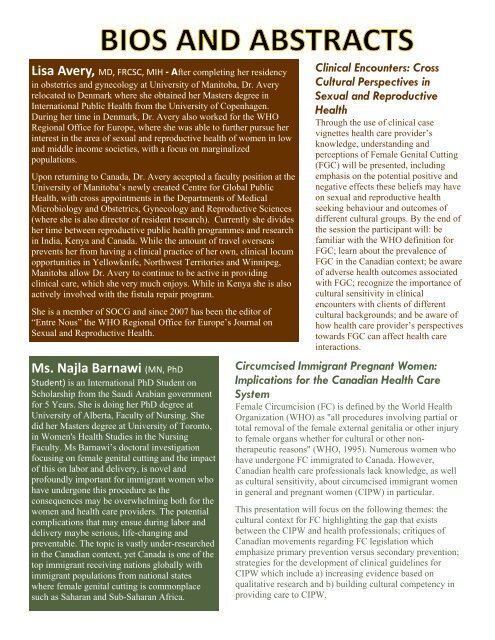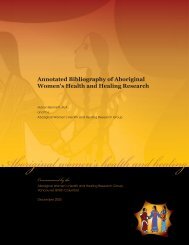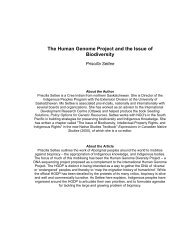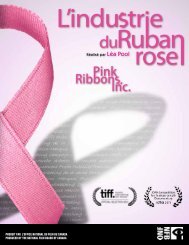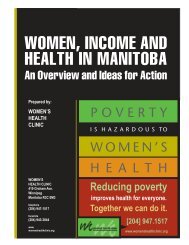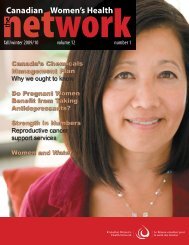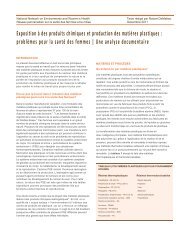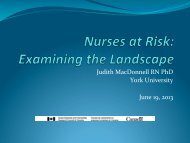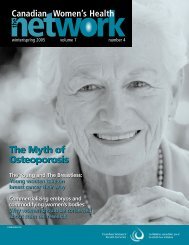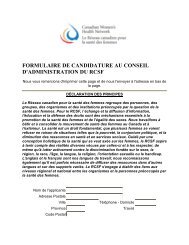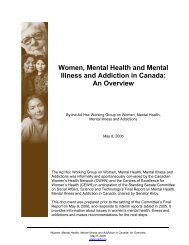FGC Symposium Program.pdf - Canadian Women's Health Network
FGC Symposium Program.pdf - Canadian Women's Health Network
FGC Symposium Program.pdf - Canadian Women's Health Network
You also want an ePaper? Increase the reach of your titles
YUMPU automatically turns print PDFs into web optimized ePapers that Google loves.
Lisa Avery, MD, FRCSC, MIH - After completing her residencyin obstetrics and gynecology at University of Manitoba, Dr. Averyrelocated to Denmark where she obtained her Masters degree inInternational Public <strong>Health</strong> from the University of Copenhagen.During her time in Denmark, Dr. Avery also worked for the WHORegional Office for Europe, where she was able to further pursue herinterest in the area of sexual and reproductive health of women in lowand middle income societies, with a focus on marginalizedpopulations.Upon returning to Canada, Dr. Avery accepted a faculty position at theUniversity of Manitoba’s newly created Centre for Global Public<strong>Health</strong>, with cross appointments in the Departments of MedicalMicrobiology and Obstetrics, Gynecology and Reproductive Sciences(where she is also director of resident research). Currently she dividesher time between reproductive public health programmes and researchin India, Kenya and Canada. While the amount of travel overseasprevents her from having a clinical practice of her own, clinical locumopportunities in Yellowknife, Northwest Territories and Winnipeg,Manitoba allow Dr. Avery to continue to be active in providingclinical care, which she very much enjoys. While in Kenya she is alsoactively involved with the fistula repair program.She is a member of SOCG and since 2007 has been the editor of“Entre Nous” the WHO Regional Office for Europe’s Journal onSexual and Reproductive <strong>Health</strong>.Ms. Najla Barnawi (MN, PhDStudent) is an International PhD Student onScholarship from the Saudi Arabian governmentfor 5 Years. She is doing her PhD degree atUniversity of Alberta, Faculty of Nursing. Shedid her Masters degree at University of Toronto,in <strong>Women's</strong> <strong>Health</strong> Studies in the NursingFaculty. Ms Barnawi’s doctoral investigationfocusing on female genital cutting and the impactof this on labor and delivery, is novel andprofoundly important for immigrant women whohave undergone this procedure as theconsequences may be overwhelming both for thewomen and health care providers. The potentialcomplications that may ensue during labor anddelivery maybe serious, life-changing andpreventable. The topic is vastly under-researchedin the <strong>Canadian</strong> context, yet Canada is one of thetop immigrant receiving nations globally withimmigrant populations from national stateswhere female genital cutting is commonplacesuch as Saharan and Sub-Saharan Africa.Clinical Encounters: CrossCultural Perspectives inSexual and Reproductive<strong>Health</strong>Through the use of clinical casevignettes health care provider’sknowledge, understanding andperceptions of Female Genital Cutting(<strong>FGC</strong>) will be presented, includingemphasis on the potential positive andnegative effects these beliefs may haveon sexual and reproductive healthseeking behaviour and outcomes ofdifferent cultural groups. By the end ofthe session the participant will: befamiliar with the WHO definition for<strong>FGC</strong>; learn about the prevalence of<strong>FGC</strong> in the <strong>Canadian</strong> context; be awareof adverse health outcomes associatedwith <strong>FGC</strong>; recognize the importance ofcultural sensitivity in clinicalencounters with clients of differentcultural backgrounds; and be aware ofhow health care provider’s perspectivestowards <strong>FGC</strong> can affect health careinteractions.Circumcised Immigrant Pregnant Women:Implications for the <strong>Canadian</strong> <strong>Health</strong> CareSystemFemale Circumcision (FC) is defined by the World <strong>Health</strong>Organization (WHO) as "all procedures involving partial ortotal removal of the female external genitalia or other injuryto female organs whether for cultural or other nontherapeuticreasons" (WHO, 1995). Numerous women whohave undergone FC immigrated to Canada. However,<strong>Canadian</strong> health care professionals lack knowledge, as wellas cultural sensitivity, about circumcised immigrant womenin general and pregnant women (CIPW) in particular.This presentation will focus on the following themes: thecultural context for FC highlighting the gap that existsbetween the CIPW and health professionals; critiques of<strong>Canadian</strong> movements regarding FC legislation whichemphasize primary prevention versus secondary prevention;strategies for the development of clinical guidelines forCIPW which include a) increasing evidence based onqualitative research and b) building cultural competency inproviding care to CIPW.


